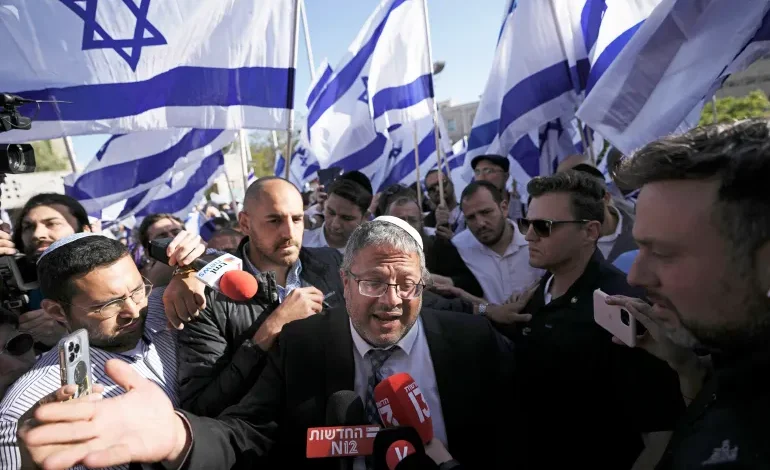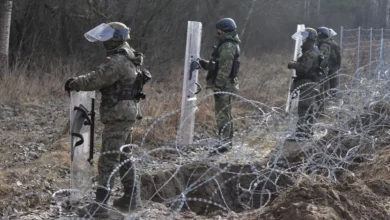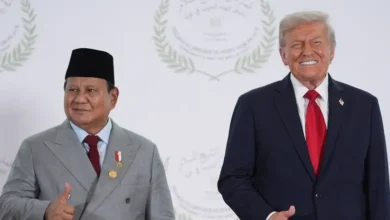Israeli cabinet approves funds for national guard under Ben-Gvir

Israel’s cabinet has voted to approve major budget cuts across ministries to fund a controversial “national guard” led by National Security Minister Itamar Ben-Gvir.
Netanyahu’s office said on Sunday that the cabinet approved the establishment of the force, but that a committee comprised of Israel’s existing security agencies would determine the guard’s authorities and whether it would be subordinate to the police, or take orders directly from Ben-Gvir, as he demands. The committee has 90 days to make its recommendations.A statement from Ben-Gvir’s office said the guard, which would operate under his ministry, would deal with “emergency scenarios, nationalistic crime, terror, and strengthening sovereignty”.
Several ministers initially opposed the project, but finally agreed to it Sunday at the insistence of Netanyahu, Israeli media reports said, adding that the budget for the project is around $276m.
Al Jazeera’s Bernard Smith, reporting from West Jerusalem, said the guard will be funded “by skimming about 1-1.5 percent of the budgets of all the other ministries”.
Opposition leader Yair Lapid slammed the cuts in health, education and security budgets to allocate money to what he’s called Ben-Gvir’s “private army”.
“The priorities of the government are ridiculous and despicable. The only thing that keeps it busy is running over democracy and promoting extreme fantasies of delusional people,” Lapid said on Twitter.
Under Ben-Gvir’s plan, the unit is to work alongside the police and military and deal with “civil unrest” nationwide.
Critics warn that Ben-Gvir could use the force of around 2,000 troops specifically against anti-government demonstrators or the Palestinian and Arab population.
David Tzur, former district commander of the Tel Aviv police force, told Al Jazeera that there is no need for a separate force.“I think we need to strengthen the existing police force,” Tzur said.
“We cannot accept that there will be any kind of law enforcement which is not under … the police commissioner. It’s very strange that the government would decide to create another police [unit] and the sense that it would be a private militia or it would be parallel to the existing forces … it would be a disaster.”
Smith said that forming a national guard is still a few months off.
“The attorney general told the cabinet she’s not convinced by the legality of this new national guard. She said as of now, there is a legal hindrance to advancing the current draft … it also has parliamentary hurdles to jump,” Smith said.
Ben-Gvir force
The vote comes after Ben-Gvir set out plans for the creation of a national guard, proposing that the force fall under the direct control of his ministry.
The proposal, published Wednesday night, called for a new armed unit of about 2,000 service members who would answer directly to Ben Gvir, to be deployed across the country to fight crime, “terror” and to strengthen governance.
Netanyahu agreed to the plan to avert Ben Gvir’s resignation, after the minister threatened to quit if Netanyahu delayed controversial reforms to Israel’s judiciary in the face of months of protest.
Ben-Gvir, an Israeli settler who was previously convicted of inciting racism and supporting a “terrorist” organisation, has long argued that a national guard was needed to combat lawlessness.
The Israeli minister has also called for greater Jewish access to the Al-Aqsa Mosque compound. Such a move would be viewed by Palestinians as provocative and as a potential precursor to Israel taking complete control over the holy site.
Ben-Gvir plans to establish a committee with representatives from the Prime Minister’s Office, Defense Ministry, Justice Ministry, Finance Ministry, Israel Police and Israeli Army to implement the establishment of the force.
Strong opposition
Civil rights groups and opposition politicians have expressed extreme concern over the proposal to form a national guard under Ben Gvir’s control.
Former army chief of staff Gadi Eisenkot said the formation of a body directly subordinate to the national security minister was a “severe event that destabilises the principles of using force in the country and endangers the country”, reported Israeli media.
Ahead of the proposal being published, the Association for Civil Rights in Israel wrote to Attorney General Gali Baharav-Miara to express deep concern over the plan. Hundreds of people gathered in central Tel Aviv to protest against the proposal last week.










